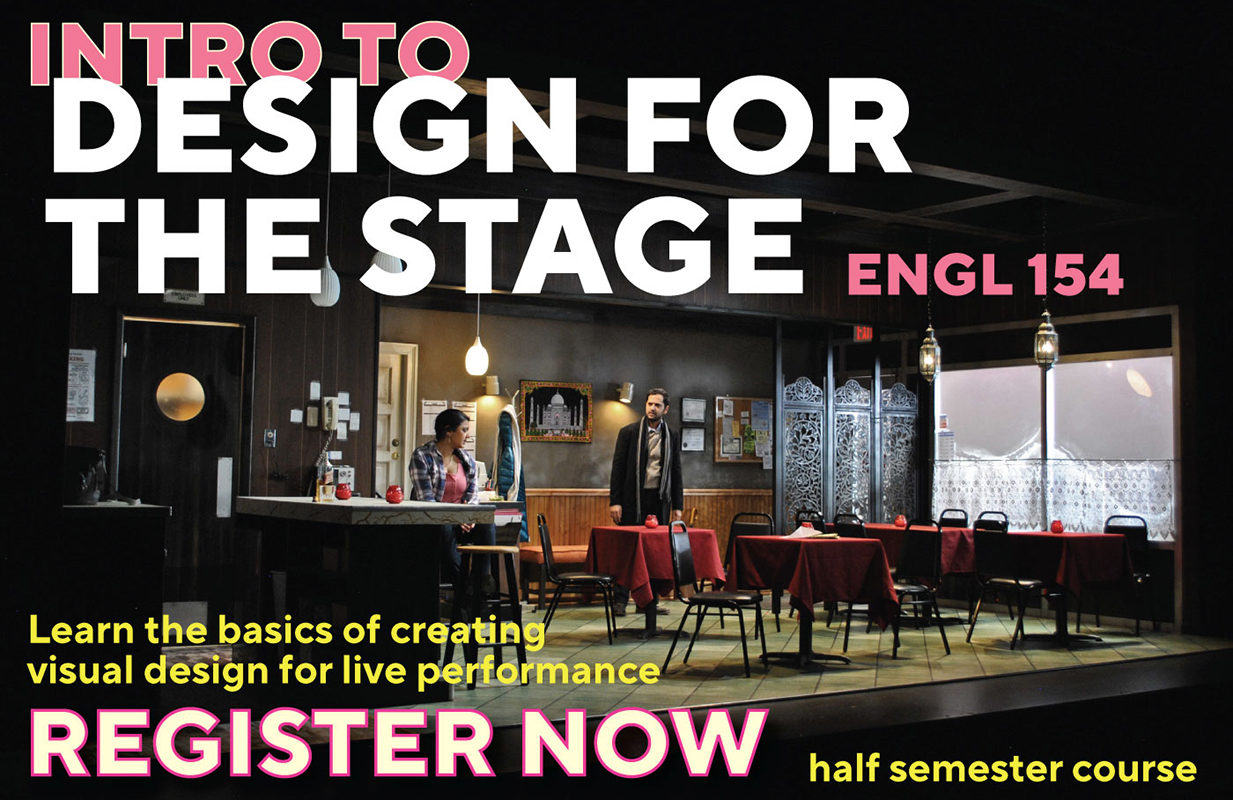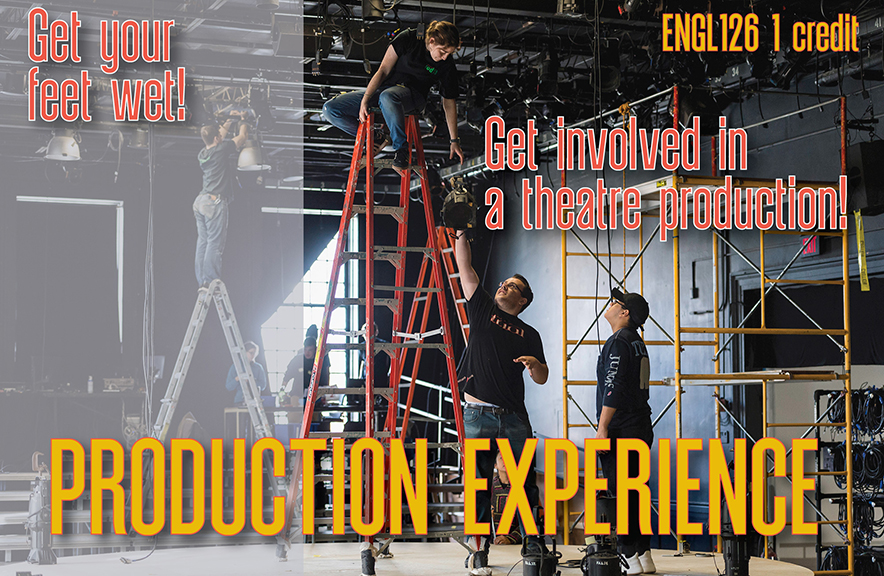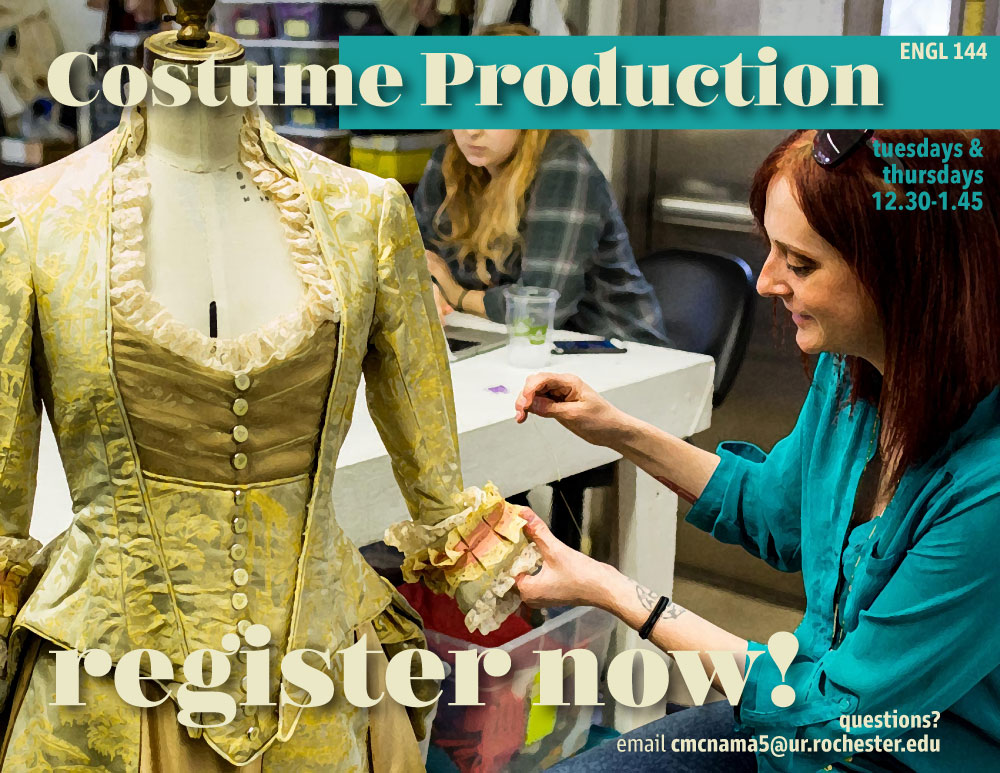Spotlight on Courses
Discover Just Some of the Theatre Program's Exciting Classes!
The Theatre Program offers classes across theatrical disciplines and, indeed, multidisciplinary courses, too. Below are just some of the courses we're spotlighting. (For a complete list of Theatre Program courses, go here.) Looking for a class? Look no further! All these courses count towards a Humanities cluster in English! Need further information? Just ask!
BOTH SEMESTERS
Jump to classes only offered in theFall | Jump to classes offered only in theSpring
ENGL 154: Intro to Design for the Stage
2 credits (1st half of each semester) | moreinfo
Space and how it is conceived and explored is fundamental to the telling of stories—onstage and elsewhere. This introductory course aims at giving students skills to create, translate and communicate a visual design/environment for performance. The class will focus on design fundamentals, materials, research and visual storytelling through class discussion, script analysis and practical work. Students will read a play, devise a concept for that play, research possible environments, and begin to produce drawings and other visual ideas for their design. Student's work will be presented and discussed in each class.

ENGL 126: Production Experience
1 credit | moreinfo
Want to get your feet wet or hands dirty doing some exciting behind-the-scenes work on Theatre Program productions? A perfect hands-on way to explore the excitement, camaraderie, creativity, and skills needed for backstage work—in lighting, sound, costumes, scenery, or stage management—is to get involved in ENGL 126 Production Experience, a 1-credit, half semester course where you get to work on actual theatre productions in the brand-new Sloan Performing Arts Center through lab participation, joining run crews, or other practical ways. You’ll learn valuable skills while contributing to the excellence in production that the International Theatre Program is known for. You’ll play a real role in making theatre happen! No prior experience needed.

FALL
ENGL 144: Costume Construction
4 credits | Fall | more info
This course will introduce students to the process of creating and altering costumes for a theatrical production. Through a variety of projects, students will learn a myriad of techniques used in hand sewing, machine sewing, and fabric manipulation. Emphasis will be placed on the ability to create a costume from initial design to a fully realized garment. Students will use these skills on multiple projects throughout the course as well as lab time where they will refine these skills on a current theatrical production. Students will also get to discover the Costume Designer's process, from initial sketch through finished garment, and will get exciting opportunities to work with guest artists on actual theatrical productions, creating a better understanding of the process and function of a professional costume shop.

SPRING
ENGL 142: Stage Combat
2 credits | Spring | more info
This course explores the concepts and techniques of theatrical violence for stage and screen. Students will stress safety and control as they learn to create the illusions of punches, kicks, throws, and falls. The course focuses on unarmed combat. In-class performances will be video recorded to study stage and film technique.

ENGL 151: Acting with Objects
4 credits | Spring | moreinfo
In this semester-long course, students will explore traditional and contemporary puppetry traditions, including history, theory, design and performance. Class participants will learn Japanese Bunraku-style (3 puppeteers working together to move one puppet) puppetry and Kuruma Ningyo-style (one-person, cart puppetry), shadow puppetry, and object performance through hands-on manipulation and exploration of breath, eyeline, focus, and micromovement. Students will explore how to tell stories with these objects, incorporating design and non-verbal communication and gesture. This class is great training for actors, dancers, and performers to explore subtlety, nuance, and how to make your performance secondary, and in service to the puppet/object, which is the primary focus of storytelling. The course will culminate in a workshop performance of original puppet pieces made by students.

ENGL 164: Improvisation
4 credits | Spring | more info
This course enables students to move progressively toward a stronger understanding of long form improvisation acting theory and skills related to listening, supporting others, heightening performance, and taking risks. By the end of this course, students will be able to work within a cast to create full-length, fully improvised plays that incorporate spontaneous monologues and scenes with recurring characters and themes. Particular focus will be paid to a format known as “The Harold”, which is widely considered the cornerstone of modern improv comedy.
ENGL 291: Musical Theatre Performance
4 credits | Spring | moreinfo
Musical Theatre is, indubitably, America's greatest home-grown theatrical form and one of the major accomplishments of American culture. From Carousel to Hadestown, Show Boat to Wicked, American musical theatre has defined, celebrated, and confronted our lives through song, dance, and dramatic character and action. The skills, techniques and talent needed to effectively embody characters from the repertoire challenge actors and singers in startling ways. This is a workshop-format, performance-based course devoted to the development of skills--both dramatic and musical--for musical theatre. We will take songs (and, potentially, scenes) from a range of musicals and explore them from a performer's point of view: investigating action, character, musicality, vocal technique, and more. The class follows a workshop model, with students performing material that is then critiqued and reworked. Students may get to work on both contemporary and Golden Age repertoire in both solo/monologue format and, potentially, in scenes or duets.
The class is intended for students with some background in musical theatre performance and is by audition only.
Want info about auditions? Here it is!

Explore ALL Theatre Program Courses!
